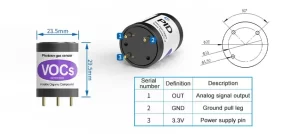-
Monitoring Air Quality: The Role of Gas Sensors in Environmental Protection
- Air pollution is a significant environmental issue that affects public health and contributes to climate change. Emissions from industries, vehicles, and natural sources such as wildfires and dust storms all contribute to air pollution. M……
- Chat Online
-
Description
Air pollution is a significant environmental issue that affects public health and contributes to climate change. Emissions from industries, vehicles, and natural sources such as wildfires and dust storms all contribute to air pollution. Monitoring air quality is crucial for identifying sources of pollution, informing policy decisions, and protecting public health. In this context, gas sensors have emerged as a vital technology for detecting and monitoring air pollutants. This article explores the advancements in gas sensors, their applications, and the role they play in environmental protection.

Understanding Gas Sensors:
Gas sensors are devices that detect and measure the concentration of various gases in the air. They work by responding to changes in the electrical properties of the gas or by analyzing the absorption of light passing through the gas. Gas sensors can detect a wide range of pollutants, including carbon monoxide, nitrogen dioxide, sulfur dioxide, ozone, and particulate matter.
Applications in Environmental Protection:
a. Air Pollution Monitoring: Gas sensors play a crucial role in monitoring air quality and identifying sources of pollution. They help in measuring the levels of harmful gases in the air and provide real-time data on air quality parameters.
b. Industrial Emissions Monitoring:
Industries are a significant source of air pollution. Gas sensors aid in monitoring industrial emissions, ensuring compliance with environmental regulations and mitigating the impact of industrial activities on the environment.
c. Indoor Air Quality Monitoring:
Indoor air pollution can be caused by various factors, including cooking, cleaning chemicals, and tobacco smoke. Gas sensors help in monitoring indoor air quality, enabling early detection of harmful pollutants and improving the health and well-being of occupants.
d. Wildfire Management:
Wildfires emit large amounts of smoke and particulate matter, which pose a significant risk to public health. Gas sensors aid in monitoring wildfire smoke, providing early warning systems to alert communities and public health officials.
Advantages of Gas Sensors:
a. High Sensitivity: Gas sensors are highly sensitive to even low concentrations of pollutants, enabling early detection and monitoring of air quality parameters.
b. Real-time Monitoring:
These sensors offer real-time monitoring capabilities, providing timely data on air quality parameters and aiding in prompt action to mitigate environmental risks.
c. Cost-effective:
Gas sensors are cost-effective compared to traditional air monitoring methods, such as laboratory analysis. They offer long-term cost benefits by enabling efficient and effective monitoring of air quality.
d. Portability:
Gas sensors are portable and can be easily deployed in various environments, enabling widespread and comprehensive monitoring of air quality.
Challenges and Future Directions:
Despite their numerous advantages, some challenges persist in the use of gas sensors for environmental monitoring. These include calibration and maintenance requirements, cross-sensitivity to other gases, and the need for standardized protocols for data collection and analysis. However, ongoing research and development are addressing these challenges, leading to more efficient and reliable sensor technologies.
Looking ahead, the future of gas sensors is promising. Advancements in miniaturization, wireless communication, and data analytics will enhance their usability and enable widespread deployment for comprehensive air quality monitoring. Furthermore, integration with artificial intelligence and machine learning algorithms will enable predictive modeling and early detection of air quality issues.

Conclusion: Gas sensors have emerged as a vital technology for detecting and monitoring air pollutants, contributing to environmental protection and public health. These sensors play a crucial role in monitoring air quality, identifying sources of pollution, and informing policy decisions. As technology continues to advance, gas sensors will play an increasingly vital role in ensuring sustainable and healthy environments, safeguarding this vital resource for future generations.
-
Recommend:
-
-
The Role of Gas Detectors in Safeguarding Public Health
Gas detectors play a crucial role in ensuring public safety…
-
Enhancing Safety Measures: Gas Detection Devices for Improved Workplace Security
Introduction: Ensuring workplace safety is of paramount imp…
-
Gas detectors are essential devices used to detect and moni…
-
Gas sensors are electronic devices that detect, measure, an…
-
 : +86 155 8830 2704
: +86 155 8830 2704 : jxdziot@gmail.com
: jxdziot@gmail.com
